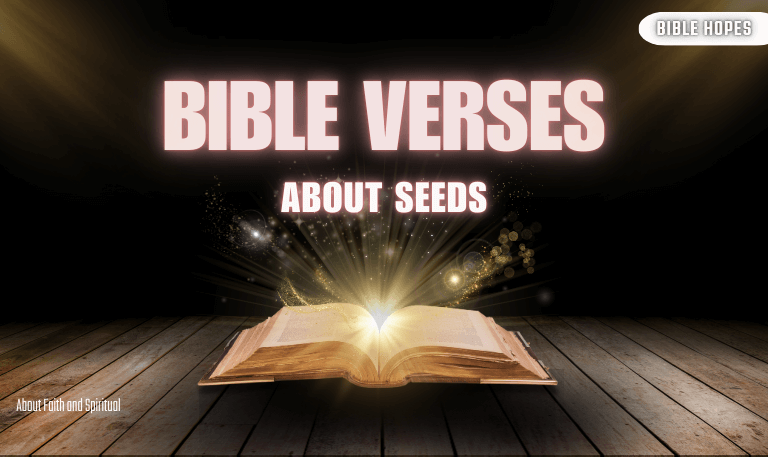The Bible is filled with profound teachings that use natural elements to illustrate deeper spiritual truths. Among these elements, seeds hold significant symbolism, representing faith, growth, transformation, and the promises of God. Whether in the context of physical planting or spiritual sowing, seeds are woven throughout scripture to convey essential lessons about how God’s word and faith can grow in our lives.
In this article, we will explore Bible verses about seeds, focusing on their spiritual significance, the lessons they impart, and practical applications for our lives. We will delve into the symbolism behind seeds in the Bible, from the mustard seed to the seed of faith, and examine key scriptures that demonstrate the power of sowing, reaping, and growing in the faith. Additionally, we will answer some common questions regarding this topic and offer insight into how you can apply these teachings to your life.
What Are Seeds in the Bible?
In biblical times, seeds were not only a source of food but also carried deep spiritual significance. From the creation story in Genesis to Jesus’ teachings in the Gospels, seeds appear frequently as symbols of life, growth, and potential. Seeds in the Bible are often used to demonstrate the concept of spiritual multiplication—how something small can produce something abundant and life-giving.
Read Also: Bible Verses For New Parents
Biblical Symbolism of Seeds
Seeds symbolize more than just physical plants in scripture. They represent God’s Word, faith, and the growth that results from planting seeds of truth in our hearts. Seeds also reflect the potential for transformation—how a small, seemingly insignificant act can lead to great spiritual fruit.
The Power of the Mustard Seed
One of the most well-known biblical references to seeds is the mustard seed, used by Jesus to illustrate the power of faith.
Matthew 17:20 (NIV)
“He replied, ‘Because you have so little faith. Truly I tell you, if you have faith as small as a mustard seed, you can say to this mountain, ‘Move from here to there,’ and it will move. Nothing will be impossible for you.'”
In this passage, Jesus uses the mustard seed—a tiny, inconspicuous seed—to convey that even a small amount of faith in God has the potential to bring about miraculous results. It emphasizes that faith, regardless of its size, when placed in the right source (God), can lead to powerful changes in one’s life.
Mark 4:30-32 (NIV)
“Again he said, ‘What shall we say the Kingdom of God is like, or what parable shall we use to describe it? It is like a mustard seed, which is the smallest of all seeds on earth. Yet when planted, it grows and becomes the largest of all garden plants, with such big branches that the birds can perch in its shade.'”
Here, the mustard seed is used to describe the Kingdom of God. Although the Kingdom may start small, it will ultimately grow to immense proportions, much like the mustard seed growing into a large tree. This metaphor encourages believers to have patience and faith in God’s ability to grow His Kingdom, even when it seems like the beginnings are humble.
Seeds of Faith and Spiritual Growth
The Bible also teaches that seeds of faith can lead to spiritual growth in our lives, transforming us into more mature believers.
Luke 8:11 (NIV)
“This is the meaning of the parable: The seed is the word of God.”
In the Parable of the Sower, Jesus explains that the seed represents God’s Word. When we hear the Word and allow it to take root in our hearts, it has the potential to grow and bear fruit in our lives. The soil in which the seed is planted represents our hearts, and the condition of our hearts determines how well God’s Word will grow in us.
Types of Soil and Spiritual Growth
In the parable, Jesus describes four types of soil:
The Path: Represents those who hear the Word but don’t understand it, and the enemy steals it away.
Rocky Ground: Represents those who receive the Word with joy but fall away when faced with trouble.
Thorny Ground: Represents those who hear the Word, but the worries of life choke it out.
Good Soil: Represents those who hear, understand, and apply the Word, allowing it to bear fruit.
This parable teaches us that spiritual growth requires a receptive heart and a willingness to nurture the seed of faith through study, prayer, and obedience.
Read Also: Bible Verses for Bad Days
The Concept of Sowing and Reaping
The Bible frequently uses the metaphor of sowing and reaping to illustrate the law of harvest: we will reap what we sow. Whether sowing seeds of faith, good works, or even generosity, this principle holds true in our spiritual lives.
Galatians 6:7-9 (NIV)
“Do not be deceived: God cannot be mocked. A man reaps what he sows. Whoever sows to please their flesh, from the flesh will reap destruction; whoever sows to please the Spirit, from the Spirit will reap eternal life.”
This passage reminds us that the actions we take—whether good or bad—will bear fruit. If we sow seeds of selfishness, we will reap destruction. But if we sow seeds of obedience and faith, we will reap the blessings of eternal life.
2 Corinthians 9:6 (NIV)
“Remember this: Whoever sows sparingly will also reap sparingly, and whoever sows generously will also reap generously.”
This verse emphasizes the importance of generosity. When we sow seeds of generosity, whether financially, spiritually, or emotionally, God promises that we will reap generously in return.
Growth and Abundance from Seeds
The Bible teaches that growth and abundance come from faithful sowing. As we plant seeds of goodness, faith, and obedience, they will yield abundant spiritual fruit.
Psalm 1:3 (NIV)
“That person is like a tree planted by streams of water, which yields its fruit in season and whose leaf does not wither—whatever they do prospers.”
This verse highlights the fruitfulness of those who meditate on God’s Word and live according to His teachings. Like a tree planted by water, their lives are constantly nourished, leading to spiritual abundance.
Jesus: The Seed That Must Die to Bear Fruit
In John 12:24, Jesus speaks about His own death using the metaphor of a seed:
John 12:24 (NIV)
“Very truly I tell you, unless a kernel of wheat falls to the ground and dies, it remains only a single seed. But if it dies, it produces many seeds.”
This passage points to the sacrificial death of Jesus, which was necessary to bring salvation to humanity. Just as a seed must die in the ground to produce new life, Jesus’ death brought new spiritual life to those who believe in Him.
Read Also: Bible Verses About Brothers
The Seed of Abraham: Spiritual Descendants and God’s Promises
The Bible also speaks about the seed of Abraham in relation to God’s covenant with His people. The descendants of Abraham are spiritual heirs, and through faith in Jesus, we are all part of the promise made to Abraham.
Galatians 3:29 (NIV)
“If you belong to Christ, then you are Abraham’s seed, and heirs according to the promise.”
Through faith in Jesus, all believers are considered part of the Abrahamic covenant, inheriting the blessings and promises given to Abraham’s descendants.
Read Also: Bible Verses About Promises
Bible Verses About Seeds FAQs
Q: What is the significance of the mustard seed in the Bible?
A: The mustard seed is used in the Bible to illustrate the power of faith. Despite its small size, the mustard seed grows into a large tree, symbolizing how even the smallest amount of faith can produce significant results.
Q: How do seeds represent faith in the Bible?
A: In the Bible, seeds represent the Word of God and faith. Just as a seed grows and produces fruit, faith, when planted in good soil (a receptive heart), grows and bears spiritual fruit in our lives.
Q: What does the Bible say about sowing and reaping?
A: The Bible teaches the principle of sowing and reaping—we reap what we sow. If we sow seeds of goodness, obedience, and faith, we will reap spiritual blessings. Conversely, sowing seeds of selfishness or sin will lead to negative outcomes.
Q: How can we apply the principle of planting seeds in our daily lives?
A: We can plant seeds of faith by reading God’s Word, praying, and living according to His teachings. We can also sow seeds of generosity, kindness, and love, trusting that these actions will produce fruit in our lives and the lives of others.
Q: What is the spiritual meaning of seed in the Bible?
A: Seeds in the Bible represent the potential for growth. They symbolize faith, obedience, God’s Word, and spiritual transformation. When planted in good soil (a receptive heart), seeds grow and bear fruit, leading to spiritual abundance.
Conclusion
The Bible’s use of seeds as a metaphor for faith, growth, and spiritual transformation offers profound insights into how we can live out our Christian faith. By embracing the teachings about sowing and reaping, faith as small as a mustard seed, and the growth that comes from God’s Word, we can cultivate lives that bear spiritual fruit, glorifying God and serving others. Just as seeds grow into something greater than themselves, so too can our faith, when nurtured and nurtured in good soil, lead to abundant blessings and a deeper relationship with God.

![Tuesday Blessings Prayers For Health & Protection [2025] 3 Tuesday-Blessings-Prayers-For-Health-&-Protection-[2025]](https://biblehopes.com/wp-content/uploads/2025/04/Tuesday-Blessings-Prayers-For-Health-Protection-2025.png)
![17 Bible Quotes About Success Motivational [2025 Guide] 4 17-Bible-Quotes-About-Success-Motivational-[2025-Guide]](https://biblehopes.com/wp-content/uploads/2025/04/17-Bible-Quotes-About-Success-Motivational-2025-Guide.png)
